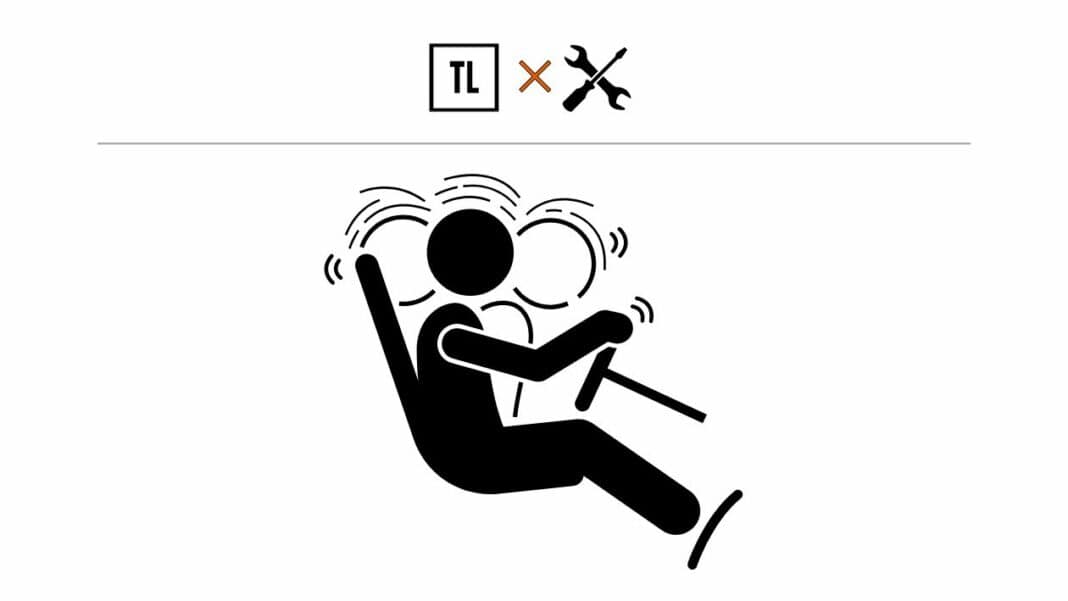First, let’s get some confusion out of the way: if you’re braking hard, and you notice some slight vibration in the pedal and the sense the brakes are going on and off, that’s just the anti-lock brakes doing what they’re supposed to, preventing the wheels from locking.
The shaking I’m referring to is definitely more noticeable and happens at all braking pressures, not just when you’re into the brakes so hard the ABS is kicking in. You will also typically feel a shudder in the steering wheel, and, unlike ABS activation, the vibration frequency will change depending on the vehicle’s speed.
In other words, if you brake and it feels like you’re driving across rumble strips, you have a problem.
Bad Brakes or Warped Rotors Could be the Issue
Modern cars today have disc brakes at the front wheels, and many have them at the rear. Disc brakes are superior to drum brakes not for adding stopping power but for added resistance to fade, which is when heat in the brakes reduces their effectiveness.
Brake fade is why it’s vitally essential in mountain driving to manage your brake use so you’re not on the brakes every second of the descent. You have to give them time to cool off, and you do that by not overestimating how slowly you need to go around certain curves, by slowing down more than needed for some, and being able to be off the brakes entirely when you can.
Ride your brakes all the way down, and there’s a good chance they just won’t be there when you really need them. Disc brakes work by squeezing rotors — heavy metal discs attached to your wheel hubs — between sets of pads driven by the hydraulics between your foot and the brake calipers.
If you’ve guessed that means the rotors must be true to be vibration-free, you’ve just diagnosed the single most likely cause of brake shudder: warped rotors. (Drum brakes can also go out of true, but it’s more likely on disc brakes.)
Replacement is Usually the Only Option
In the old days, rotors could be turned on a lathe and returned to true at least once, sometimes more often. Today’s cars, with an emphasis on reducing weight, often have rotors that don’t have enough metal in them to survive even one trip to the lathe.
Today, parts prices and typical shop rates can mean it’s nearly as expensive to pay a mechanic to turn the rotors as it is to simply buy new ones.
Which means replacement. It’s inexpensive and can be a do-it-yourself project for the handy. Chances are, you’ll pay more for the labour to do the work than you will for the parts themselves.
Cheap Brake Pads Equal False Economy
Of course, it’s also an excellent time to check the brake pads. Your mechanic can give you an idea of the life left in them, and if they’re close to the end, you might as well replace them, too. Otherwise, you’ll just be paying much of the same labour costs again down the road.
If you do replace your pads, make sure they’re at least comparable to OEM quality. There’s a reason your car’s original pads may have lasted 44,000 miles or 70,000 km, but your new ones only made it to 15,000 miles or 24,000 km. If in doubt, get pads from your dealer, even if you take them elsewhere for installation. Similarly, don’t jump at the cheapest rotor available, either.
How To Prevent Warping of Brake Rotors
As with most failures in vehicles, sometimes, it just happens. But a few things can hasten the warping of rotors, which points to a few ways to delay the onset of issues.
Heat and cold warp metal
If your aluminum fry pan no longer sits evenly on your stove, you know what I mean: you cooked your food and immediately doused the pan with cold water afterward. The temperature shock contorted your pan.
The same thing happens with brake rotors. Drive through a puddle while your brakes are hot, such as after a mountain descent or some spirited driving on twisty roads, and you have a good chance of warping rotors.
Applying your parking brake while the rotors are hot can also lead to warping, as well as cooking the pads to the rotors. It’s not as though the rotors are non-stick.
If where you park demands you use your parking brake, give the car a few blocks’ worth of driving with only light braking to help it cool off first.
This advice applies regardless of whether you have four-wheel disc brakes: the damage can be just as bad on drum brakes, and there’s a chance your car’s parking brake does not activate at a rear wheel, too. Some vehicles with electric parking brakes will use a front wheel instead of a rear wheel.
We hope this helped you with safe (rumble-free) driving out there.


